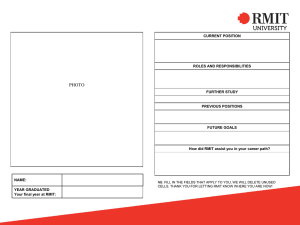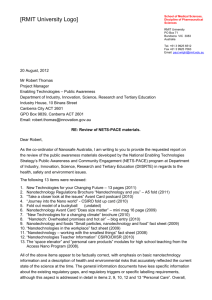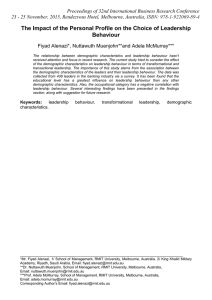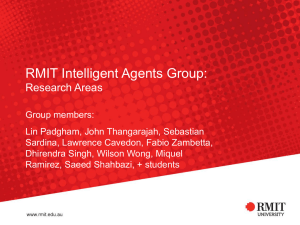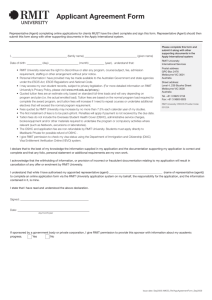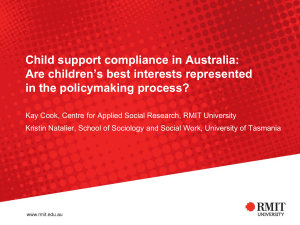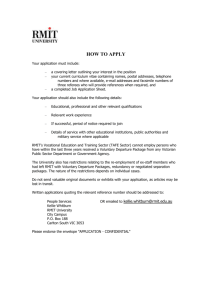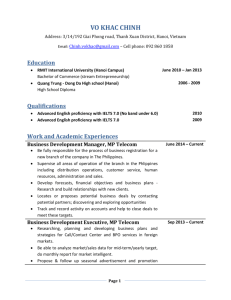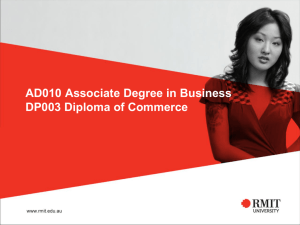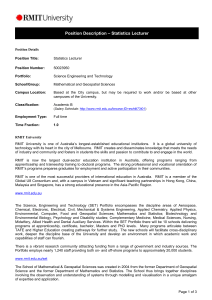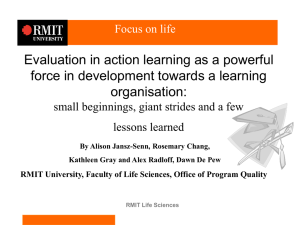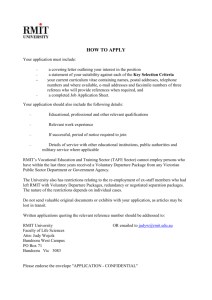The Platform Technologies Research Institute held the 2009 Annual
advertisement
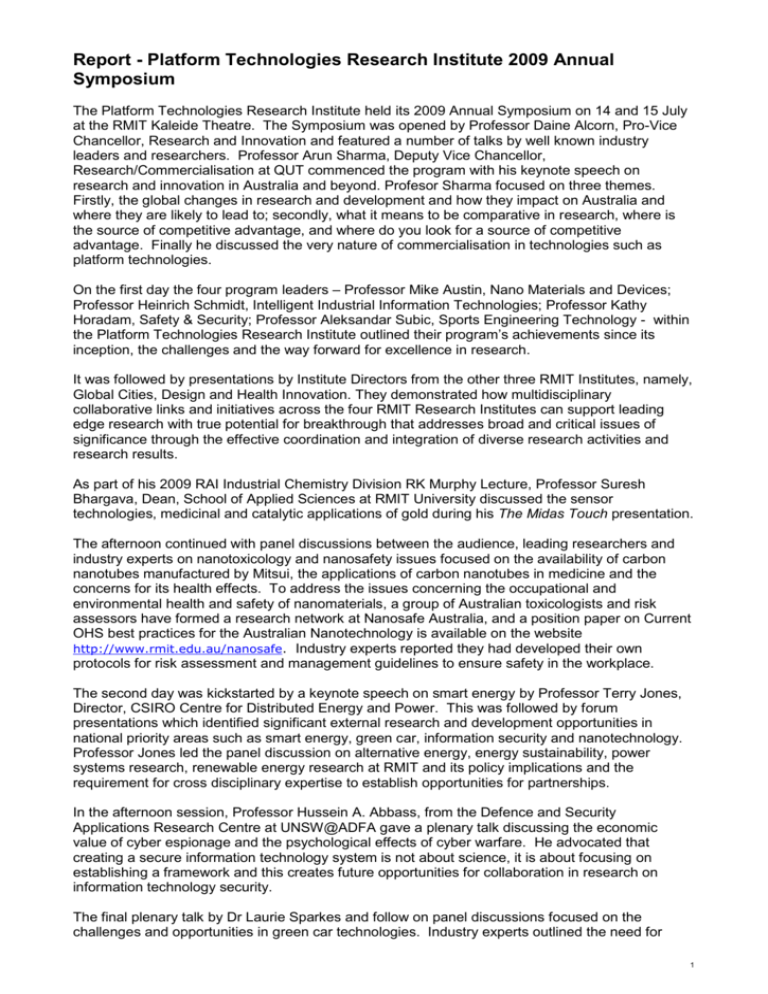
Report - Platform Technologies Research Institute 2009 Annual Symposium The Platform Technologies Research Institute held its 2009 Annual Symposium on 14 and 15 July at the RMIT Kaleide Theatre. The Symposium was opened by Professor Daine Alcorn, Pro-Vice Chancellor, Research and Innovation and featured a number of talks by well known industry leaders and researchers. Professor Arun Sharma, Deputy Vice Chancellor, Research/Commercialisation at QUT commenced the program with his keynote speech on research and innovation in Australia and beyond. Profesor Sharma focused on three themes. Firstly, the global changes in research and development and how they impact on Australia and where they are likely to lead to; secondly, what it means to be comparative in research, where is the source of competitive advantage, and where do you look for a source of competitive advantage. Finally he discussed the very nature of commercialisation in technologies such as platform technologies. On the first day the four program leaders – Professor Mike Austin, Nano Materials and Devices; Professor Heinrich Schmidt, Intelligent Industrial Information Technologies; Professor Kathy Horadam, Safety & Security; Professor Aleksandar Subic, Sports Engineering Technology - within the Platform Technologies Research Institute outlined their program’s achievements since its inception, the challenges and the way forward for excellence in research. It was followed by presentations by Institute Directors from the other three RMIT Institutes, namely, Global Cities, Design and Health Innovation. They demonstrated how multidisciplinary collaborative links and initiatives across the four RMIT Research Institutes can support leading edge research with true potential for breakthrough that addresses broad and critical issues of significance through the effective coordination and integration of diverse research activities and research results. As part of his 2009 RAI Industrial Chemistry Division RK Murphy Lecture, Professor Suresh Bhargava, Dean, School of Applied Sciences at RMIT University discussed the sensor technologies, medicinal and catalytic applications of gold during his The Midas Touch presentation. The afternoon continued with panel discussions between the audience, leading researchers and industry experts on nanotoxicology and nanosafety issues focused on the availability of carbon nanotubes manufactured by Mitsui, the applications of carbon nanotubes in medicine and the concerns for its health effects. To address the issues concerning the occupational and environmental health and safety of nanomaterials, a group of Australian toxicologists and risk assessors have formed a research network at Nanosafe Australia, and a position paper on Current OHS best practices for the Australian Nanotechnology is available on the website http://www.rmit.edu.au/nanosafe. Industry experts reported they had developed their own protocols for risk assessment and management guidelines to ensure safety in the workplace. The second day was kickstarted by a keynote speech on smart energy by Professor Terry Jones, Director, CSIRO Centre for Distributed Energy and Power. This was followed by forum presentations which identified significant external research and development opportunities in national priority areas such as smart energy, green car, information security and nanotechnology. Professor Jones led the panel discussion on alternative energy, energy sustainability, power systems research, renewable energy research at RMIT and its policy implications and the requirement for cross disciplinary expertise to establish opportunities for partnerships. In the afternoon session, Professor Hussein A. Abbass, from the Defence and Security Applications Research Centre at UNSW@ADFA gave a plenary talk discussing the economic value of cyber espionage and the psychological effects of cyber warfare. He advocated that creating a secure information technology system is not about science, it is about focusing on establishing a framework and this creates future opportunities for collaboration in research on information technology security. The final plenary talk by Dr Laurie Sparkes and follow on panel discussions focused on the challenges and opportunities in green car technologies. Industry experts outlined the need for 1 research and development for the next generation of green cars to be produced by the new manufacturers such as Tesla Motors and Swatch Australia. Current manufacturers have a high level of capital investment in current technologies and infrastructure and are unlikely to commit to investment in new technology if it is not considered commercially viable to produce a green car. To make it attractive to the general public, it has to be affordable with storage methods for long distance driving. The panel agreed that the way forward was to develop a research partnership with the School of Psychology to determine the public’s reaction to the introduction of the green car. Researchers were encouraged to develop partnerships with new industrial players and consider the alternative fuel option. Australia has a large supply of gas and to develop a multi fuel engine would be groundbreaking for the industry. Finally, it was essential to consider an extension of the life cycle of the product, embrace a new philosophy of design and architecture and include recycled materials. Participants were left to consider embracing two green car options: electric or gas conversion of existing vehicles. Professor Xinghuo Yu, Director, Platform Institute of Technologies, concluded the Symposium by thanking all presenters and participants, commenting that “The Symposium promotes broadly based collaborative research both within and among disciplines, schools and colleges, as well as with industry and community across the country and abroad. I look forward to progressing new research collaborations within RMIT and with our partners.” Please check the links below for details on the presentations and audiovisual recordings. If you are interested in collaborating with researchers and industry on any of these projects, please contact us at platformtechnologies@rmit.edu.au 2
